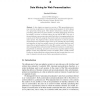104 search results - page 15 / 21 » Discovering Hidden Knowledge from Biomedical Literature |
KDD
2005
ACM
14 years 8 months ago
2005
ACM
Web users display their preferences implicitly by navigating through a sequence of pages or by providing numeric ratings to some items. Web usage mining techniques are used to ext...
CORR
2007
Springer
13 years 7 months ago
2007
Springer
Discrete temporal transitions occur in a variety of domains, but this work is mainly motivated by applications in molecular biology: explaining and analyzing observed transcriptome...
ATAL
2008
Springer
13 years 9 months ago
2008
Springer
The ability for an agent to reason under uncertainty is crucial for many planning applications, since an agent rarely has access to complete, error-free information about its envi...
ADAPTIVE
2007
Springer
14 years 1 months ago
2007
Springer
Abstract. In this chapter we present an overview of Web personalization process viewed as an application of data mining requiring support for all the phases of a typical data minin...
CSE
2009
IEEE
14 years 2 months ago
2009
IEEE
—The hidden knowledge in social networks data can be regarded as an important resource for criminal investigations which can help finding the structure and organization of a crim...

